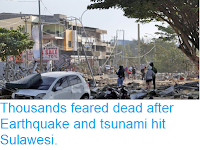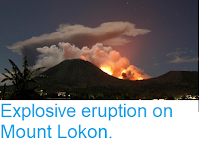Authorities on the Indonesian island of Siau, in the Sangihe Archipelago to the north of Sulawesi, have extended an exclusion zone around Mount Karangetang, a 1784 m high stratovolcano (cone-shaped volcano) on the northern end of the island, following a pyroclastic flow (flow of heavy superheated gas containing large amounts of hot ash, rocks and debris) on Tuesday 5 February 2019, which blocked a road on the island. Mount Karangetang is one of Indonesia's most active volcanoes, typically erupting several times per year, with the current phase of eruptions having begun in November 2018, after several months of inactivity.
Pyroclastic flow blocking a road on Siau Island, Indonesia on 5 February 2019. 3 alacarta.
Siau Island is quite densely populated with around 22 000 permanent
residents, and Mount Karangetang frequently causes problems for the islanders,
having most recently caused fatalities in August 2010. The Sangihe Island Arc is a chain of volcanic islands running between
the northern tip of Sulawesi and the southern tip of Mindanao. The chain
marks the boundary between the Molucca Plate to the east and the
Sangihe Plate to the west, with the Molucca Plate being subducted
beneath the Sangihe Plate. As the Molucca Plate sinks into the Earth it
is heated by the friction and the heat of the planet's interior, causing
it to partially melt. Some of the melted material then rises through
the overlying Sangihe Plate as magma, fuelling the volcanoes of the
Sangihe Arc.
The subduction zones beneath Sulawesi and the surrounding islands. Hall & Spakman (2015).
See also...
Follow Sciency Thoughts on Facebook.








